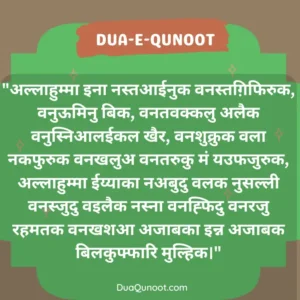Overview
The Dua Qunoot holds significant reverence among Muslims and is mentioned in Hadith literature, deeply intertwined with various prayers.
It is commonly recited during Witr salah according to the Hanafi fiqh and during Salatul Fajr in the Shafi’i fiqh, reflecting its adaptability in Islamic practices.
While not obligatory in Witr Salah, its recitation follows the tradition of Prophet Muhammad (ﷺ), who recited it in various prayers like Fajr, Maghrib, and Isha.
This flexibility allows Muslims to incorporate heartfelt supplications in their worship, aligning with the Sunnah and enriching their spiritual connection with Allah.
When To Recite Dua Qunoot Before Or After Ruku?
Many scholars advocate that the Qunoot supplication should occur post-bowing or after the Ruku (following the recitation of “Sami allahu liman hamidah rabbana lakal hamd”).
Subsequently, one would raise their hands in supplication and articulate the Qunoot prayer. Upon completion, the imam would initiate the takbeer, “Allahu Akbar,” transitioning into sujud.
Alternatively, it remains permissible for the Qunoot dua to precede the Ruku, ensuring flexibility within the prayer method.
Dua E Qunoot
Dua Qunoot In Arabic
اَللَّهُمَّ إنا نَسْتَعِينُكَ وَنَسْتَغْفِرُكَ وَنُؤْمِنُ بِكَ وَنَتَوَكَّلُ عَلَيْكَ وَنُثْنِئْ عَلَيْكَ الخَيْرَ وَنَشْكُرُكَ وَلَا نَكْفُرُكَ وَنَخْلَعُ وَنَتْرُكُ مَنْ ئَّفْجُرُكَ اَللَّهُمَّ إِيَّاكَ نَعْبُدُ وَلَكَ نُصَلِّئ وَنَسْجُدُ وَإِلَيْكَ نَسْعأئ وَنَحْفِدُ وَنَرْجُو رَحْمَتَكَ وَنَخْشآئ عَذَابَكَ إِنَّ عَذَابَكَ بِالكُفَّارِ مُلْحَقٌ

Dua Qunoot In Roman English
Allah humma inna nasta-eenoka wa nastaghfiruka wa nu’minu bika wa natawakkalu alaika wa nusni alaikal khair, wa nashkuruka wala nakfuruka wa nakhla-oo wa natruku mai yafjuruka, Allah humma iyyaka na’budu wa laka nusalli wa nasjud; wa ilaika nas aaa wa nahfizu wa narju rahma taka wa nakhshaa azaabaka; inna azaabaka bil kuffari mulhik.

Dua E Qunoot In Hindi
“अल्लाहुम्मा इना नस्तआईनुक वनस्तग़िफिरुक, वनुऊमिनु बिक, वनतवक्कलु अलैक वनुस्निआलईकल खैर, वनशुक्रुक वला नकफुरुक वनखलुअ वनतरुकु मं यउफजुरुक, अल्लाहुम्मा ईय्याका नअबुदु वलक नुसल्ली वनस्जुदु वइलैक नस्ना वनह्फिदु वनरजु रहमतक वनखशआ अजाबका इन्न अजाबक बिलकुफ्फारि मुल्हिक।”

Dua E Qunoot Meaning
Dua Qunoot Meaning In English
O Allah! We implore You for help and beg forgiveness of You and believe in You and rely on You and extol You and we are thankful to You and are not ungrateful to You and we alienate and forsake those who disobey You. O Allah! You alone do we worship and for You do we pray and prostrate and we betake to please You and present ourselves for the service in Your cause and we hope for Your mercy and fear Your chastisement. Undoubtedly, Your torment is going to overtake infidels O Allah!
Dua Qunoot Meaning In Urdu
اللہ! ہم تم سے مدد مانگتے ہیں اور تم سے معافی مانگتے ہیں اور تم پر ایمان رکھتے ہیں اور تم پر بھروسہ کرتے ہیں اور ہم تم پر شکر گزار ہیں اور ہم تمہاری ناشکراہی نہیں کرتے اور ہم انہیں الگ کرتے ہیں جو تم سے نافرمانی کرتے ہیں۔ اللہ! ہم صرف تمہیں ہی عبادت کرتے ہیں اور تمہیں ہی پوجتے ہیں اور سجدہ کرتے ہیں اور ہم تمہیں راضی کرنے کے لئے حاضر ہوتے ہیں اور خود کو تمہارے لئے قربان کرتے ہیں اور ہم تمہاری رحمت کی امید رکھتے ہیں اور تمہارے عذاب سے ڈرتے ہیں۔ بے شک، تمہارا عذاب کافروں تک پہنچنے والا ہے، اللہ
Dua Qunoot Meaning In Hindi
“अल्लाह! हम तुम से मदद माँगते हैं और तुम से माफ़ी माँगते हैं और तुम पर ईमान रखते हैं और तुम पर भरोसा करते हैं और हम तुम पर शुक्रगुज़ार हैं और हम तुम्हारी नाशुक्री नहीं करते हैं और हम उन्हें अलग करते हैं जो तुम से नाफ़रमानी करते हैं। अल्लाह! हम सिर्फ़ तुम्हें ही पूजते हैं और तुम्हें ही पूजते हैं और सजदे करते हैं और हम तुम्हें खुश करने के लिए हाज़िर होते हैं और अपने आप को तुम्हारे लिए क़ुरबान करते हैं और हम तुम्हारी रहमत की उम्मीद रखते हैं और तुम्हारे अज़ाब से डरते हैं। बेशक, तुम्हारा अज़ाब काफ़िरों तक पहुँचने वाला है, अल्लाह!”
Which of the two dua e qunoot should be recited?
In the realm of supplication (dua), Ibn ‘Uqayl al-Hanbali (may Allah have mercy on him) articulates a significant principle: Duas attributed to the Prophet Muhammad (peace and blessings be upon him) ought to be recited in their original form as regularly reported.
Any additions beyond the original form are considered concessions. He emphasizes the preferred practice, citing a narration from al-Hasan ibn ‘Ali, wherein the Prophet (peace and blessings be upon him) invoked, “Allahumma ihdini…” (O Allah, guide me…), a widely recognized hadith.
Ibn ‘Uqayl further suggests that supplementing this with the words of ‘Umar (may Allah be pleased with him), “Allahumma inna nasta‘eenuka…” (O Allah, we seek Your help…), is permissible and commendable.
This nuanced understanding is echoed in Ibn Muflih’s commentary on al-Muharrar, underscoring the importance of adhering to authentic prophetic traditions while acknowledging permissive adjustments in certain circumstances (Ibn Muflih, al-Muharrar, 1/89).
Benefits Of Dua E Qunoot
- It helps deepen the spiritual bond with Allah, offering a moment of intimate communication and remembrance.
- Regular recitation boosts faith and reminds believers of Allah’s power and mercy.
- Reciting Dua e Qunoot together strengthens the sense of community and solidarity among worshippers.
- The dua includes prayers for protection from difficulties and challenges, trusting Allah to keep them safe.
- It allows Muslims to seek forgiveness for their sins and mistakes, reflecting on past actions.
- Dua e Qunoot is a powerful prayer asking for Allah’s aid, guidance, and protection.
Is Dua Qunoot Compulsory in Witr prayer?
The practice of reciting Qunoot during every night prayer varies among scholars. Some see it as commendable, while others don’t consider it a consistent Sunnah due to lack of clear evidence from the Prophet Muhammad (peace be upon him).
Including Qunoot in Witr prayer is praiseworthy, and alternating its recitation is also permissible.
Ultimately, the choice depends on personal preference and scholarly interpretations, with the final judgment belonging to Allah.
When To Read Dua E Qunoot?
Different Islamic schools of thought offer varied perspectives on the recitation of Dua Qunoot:
Hanafi: According to the Hanafi school of thought, Dua Qunoot should be recited in the Witr prayer. In some cases, it may also be recited in other prayers, but there is a condition: the Imam must recite it audibly, and the congregation (Muqtadi) responds with “Ameen.”
Maliki: The Maliki school holds that Dua Qunoot should only be recited in the Fajr prayer. There is no practice of reciting Dua Qunoot in the Witr prayer according to this school of thought.
Shafi: In accordance with the Shafi school, Dua Qunoot is recited specifically in the Witr prayer during Ramadan. Outside of Ramadan, it is reserved for the Fajr prayer and should not be recited in the Witr prayer. There are limited circumstances where it may be recited in other prayers.
Hanbali: According to the Hanbali school, Dua Qunoot is recited in the Witr prayer, and it may also be recited in other prayers under certain conditions. However, it is prohibited to recite it during the Friday (Jumaa) prayer in this school of thought.
Each school of thought provides guidelines regarding the recitation of Dua Qunoot, reflecting diverse interpretations and practices within the Islamic tradition.
5 Sources Of Dua E Qunoot From The Holy Hadith
Scholars say that a person can recite dua e qunoot before and after Rukuh as well; both ways are acceptable.
Some say that it is better to recite it before Rukuh, but reciting it after Rukuh is not wrong either.
Narrated Muhammad bin Seereen: Anas was asked, “Did the Prophet (ﷺ) recite Qunut in the Fajr prayer?” Anas replied in the affirmative. He was further asked, “Did he recite Qunut before bowing?” Anas replied, “He recited Qunut after bowing for some time (for one month).” Sahih al-Bukhari 1001
Qunut Dua can be recited in the third Rak’ah of Isha prayer after Surah Fatiha and reciting any other Surah. It is recommended that it should be recited with focus from the core of our heart. In this way, we will not only focus on its meaning but also gain maximum benefits from it.
The hadees about when to recite Dua Qanoot given below:
It was narrated from Ubayy bin Ka’b that: The Messenger of Allah (ﷺ) used to pray witr with three rak’ahs. In the first he would recite: “Glorify the Name of Your Lord, the Most High” in the second: “Say: O you disbelievers!”, and in the third: “Say: He is Allah, (the) One”. And he would say the Qunut before bowing, and when he finished he would say: Subhanal-Malikil-Quddus (Glory be to the Sovereign, the Most Holy) three times, elongating the words the last time. Sahih (Darussalam) Sunan an-Nasa’i 1699
Abu Dawud said: This version of tradition is not well know. There is doubt that Hafs might have narrated this tradition from some other narrator than Mis’ar. Abu Dawud said: It is reported that Ubayy (b. Ka’b) used to recited the supplication (in the witr) in the second half of Ramadan. Sahih (Al-Albani) Sunan Abi Dawud 1427
Narrated Al-Hasan ibn Ali: The Messenger of Allah (ﷺ) taught me some words that I say during the witr. (The version of Ibn Jawwas has: I say them in the supplication of the witr.) They were: “O Allah, guide me among those Thou hast guided, grant me security among those Thou hast granted security, take me into Thy charge among those Thou hast taken into Thy charge, bless me in what Thou hast given, guard me from the evil of what Thou hast decreed, for Thou dost decree, and nothing is decreed for Thee. He whom Thou befriendest is not humbled. Blessed and Exalted art Thou, our Lord.” Sahih (Al-Albani) Sunan Abi Dawud 1425
It was narrated that Anas bin Malik said: He was asked about Qunut in the Subh prayer, and he said: “We used to recite Qunut before Ruku’ and afterwards.” Hasan (Darussalam) Sunan Ibn Majah 1183
Sources:-
Shih al-Bukhari1001
Sahih (Darussalam) Sunan an-Nasa’i 1699
Hasan (Darussalam) Sunan Ibn Majah 1183
Sahih (Al-Albani) Sunan Abi Dawud 1425
Sahih (Al-Albani) Sunan Abi Dawud 1427
Dua E Qunoot PDF
Dua E Qunoot mp3 Download
Video Of Qunoot
Last Word
It’s important to recognize that there are different opinions and practices regarding religious rituals, such as reciting Dua Qunoot during prayers. If someone chooses not to include it, they should not be criticized or judged.
This diversity in practice reflects the richness of Islamic scholarship. Religion is ultimately about sincerity and devotion to Allah (swt). Just as Prophet Muhammad (peace be upon him) demonstrated different methods of worship, individuals may have their own preferences.
The goal of any religious practice is to seek the pleasure of Allah (swt). As long as people strive to worship sincerely according to their understanding of Islam, their efforts should be respected within the Muslim community.
FAQs
when to say dua qunoot in witr prayer?
In the Witr prayer, Dua Qunoot is typically recited after the completion of the recitation of Surah Al-Fatiha and another Surah in the third Rak’ah (unit) of the Witr prayer. After finishing the recitation of the Quranic verses in the third Rak’ah, the worshipper raises their hands and recites the supplication known as Dua Qunoot.
what can I recite instead of dua qunoot?
Instead of reciting Dua Qunoot in the Witr prayer, you can recite other supplications. And try to memorize dua e qunoot.
Is dua e qunoot compulsory in witr?
There are some different read the full article you will get your answer.
how many dua qunoot are there?
Mainly two again read the full article you will get your info.
how to learn dua e qunoot?
Learning Dua e Qunoot is a simple process that involves familiarizing yourself with the supplication and practicing its recitation. Here are some steps to help you learn Dua e Qunoot:
1. Understand the Meaning: Begin by understanding the meaning and significance of Dua e Qunoot. It is essential to comprehend the words you are reciting and the purpose behind them.
2. Memorize the Dua: Start by memorizing the Dua e Qunoot. Break down the supplication into smaller sections and repeat each part until you can recite it confidently from memory. You can use transliterations, translations, and audio recordings to aid in memorization.
3. Listen to Recitations: Listen to recitations of Dua e Qunoot by proficient reciters. Hearing the supplication being recited can help reinforce your memorization and pronunciation.
4. Repeat Regularly: Practice reciting Dua e Qunoot regularly, especially during your nightly prayers or Witr prayer. Repetition is key to committing the supplication to memory and mastering its recitation.
5. **Seek Guidance:** If possible, seek guidance from knowledgeable individuals, such as scholars, teachers, or fellow Muslims who are familiar with Dua e Qunoot. They can provide insights, correct pronunciation, and offer assistance in memorization.
6. **Reflect on the Meaning:** As you learn and recite Dua e Qunoot, take time to reflect on the meaning of the supplication. Understand the profound message and intentions behind each word, and connect with the spiritual essence of the dua.
7. **Be Patient and Persistent:** Learning Dua e Qunoot may take time and effort, so be patient with yourself and stay persistent in your practice. Consistent effort and dedication will ultimately lead to mastery.
By following these steps and remaining dedicated to your learning process, you can effectively learn and incorporate Dua e Qunoot into your prayers with confidence and sincerity.
Can Dua E Qunoon Found In The Quran?
No, the dua e-qunoot is not mentioned in the Qur’an it is the Sunnah of the Prophet (ﷺ).
How to pray witr if you don’t know dua qunoot?
It is important to memorize dua e qunoot, but it can be read from paper till memorized.
Is witr mandatory or fard?
While many scholars hold the view that offering the Witr prayer is a recommended Sunnah and not obligatory, the Hanafi school of thought maintains that Witr prayer is compulsory (Wajib). According to Hanafi jurisprudence, performing the Witr prayer is a duty owed to Allah, and it holds the status of an obligatory act of worship. Therefore, if a person misses the Witr prayer due to any reason, they are required to make it up by performing the missed Witr prayer separately, known as Qaza. This distinction in opinion reflects the diversity within Islamic jurisprudence and underscores the importance of understanding different interpretations and practices within the broader Islamic tradition.
Is dua e Qunoot from the Quran?
No, Qunut dua is not from the Quran, but it is the sunnah of Hazrat Muhammad SAW. Our Prophet SAW used to recite this dua.
1 thought on “Dua Qunoot Read & Download | Meaning | Images | PDF | mp3 Downlod”